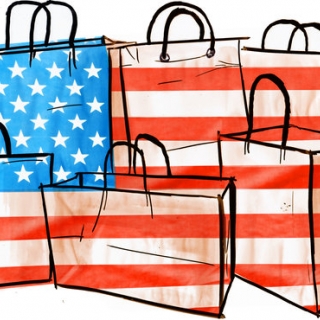


The U.S. has signaled it will not let up on its Aug. 1 deadline for higher tariffs on the European Union as the bloc fights to strike a deal in time.
Over the weekend, U.S. Commerce Secretary Howard Lutnick said he was confident a trade deal could be struck with the European Union, but warned that the deadline for a baseline 30% tariff is fixed.
"That's a hard deadline, so on August 1, the new tariff rates will come in," Lutnick said Sunday on CBS News when asked about the deadline for his EU tariffs.
He did signal that talks could continue after this date, however, noting: "These are the two biggest trading partners in the world, talking to each other. We'll get a deal done. I am confident we'll get a deal done."
"Nothing stops countries from talking to us after August 1, but they're going to start paying the tariffs on August 1," he added.
The EU has said it is preparing retaliatory measures against the U.S. if punitive trade tariffs are imposed. Lutnick dismissed the possibility of the EU targeting items like Boeing airplanes and Kentucky bourbon, however, saying, "they're just not going to do that."
Last-ditch talks to reach a trade agreement are ongoing, with the EU hoping it can negotiate a lower tariff rate. The bloc had hoped it could strike a similar pact to the U.K., which was the first country to make a trade agreement with the U.S. That deal includes a 10% baseline tariff with some caveats relating to car, steel and aerospace imports.
But economists and analysts have become increasingly skeptical about Brussels' ability to agree on a similar framework.
For one, the EU has a much trickier relationship with U.S. President Donald Trump than the U.K. does. Trump has frequently bemoaned what he sees as an imbalanced trade relationship and unfair trading practices, which the EU denies.
According to the European Council, total trade between the EU and U.S. amounted to 1.68 trillion euros ($1.96 trillion) in 2024. While the EU ran a trade surplus in goods, it recorded a deficit in services. Overall, the bloc had a surplus of around 50 billion euros last year, when both goods and services are taken into account.
Last Friday, the Financial Times reported that Trump was pushing for a minimum tariff of 15% to 20% on EU imports in any deal with the bloc. The president was also reportedly happy to keep duties on the auto sector at 25%, a move that would hurt car exporters in Germany particularly hard.
Speaking to CNBC's "Europe Early Edition" on Monday, Arnaud Girod, head of economics and cross-asset strategy at Kepler Cheuvreux, said a rate of 15% to 20% "would be a total car crash for European exports."
"On top of that, you add the euro strength that we've had ... so that would start to cost and to be very painful for European exports, and, of course, would also potentially, you know, reignite some fears on the inflation front in the U.S.," he added.
Source: CNBC
Japan's annual inflation rate edged down to 2.9% in November 2025 from October's 3-month high of 3.0%. Core inflation stood at 3.0%, keeping the same pace as in October and aligning with estimates. Mo...
Goldman Sachs sees gold prices climbing 14% to $4,900 per ounce by December 2026 in its base case, it said in a note on Thursday, while citing upside risks to this view due to a potential broadening o...
The BRICS group of countries is increasingly being considered as an alternative for global diplomacy and cooperation amidst increasing tariff and protectionist policies from the United States. A numbe...
Applications for US unemployment benefits fell after a spike in the previous week, underscoring the choppy nature of the data at this time of year. Initial claims decreased by 13,000 to 224,000 ...
Annual inflation in the United States (US), as measured by the change in the Consumer Price Index (CPI), fell 2.7% in November, according to a report by the US Bureau of Labor Statistics (BLS) on Thur...
Oil prices are headed for a second weekly decline as concerns over a growing oversupply outweigh geopolitical risks to supply. Brent crude edged up to $60 a barrel on Friday but is still down about 2% for the week, while West Texas Intermediate is...
President Vladimir Putin said he is willing to discuss ending Russia's war in Ukraine, despite rejecting changes sought by Kyiv and Europe to the U.S. peace plan drafted with Moscow. Putin said he has "practically agreed" to the proposals to end...
Gold prices fell slightly on Friday (December 19), pressured by a stronger dollar and year-end investor positioning, but are poised to end the week higher as weaker US inflation data raised speculation of an interest rate cut. Spot gold prices...
 Fed Governor Christopher Waller said Wednesday that the Fed is in no rush to cut interest rates, given the current outlook, according to...
Fed Governor Christopher Waller said Wednesday that the Fed is in no rush to cut interest rates, given the current outlook, according to...
 The Bank of Japan (BOJ) is expected to raise interest rates on Friday to a three-decade high, from 0.5% to 0.75%, signaling readiness for further...
The Bank of Japan (BOJ) is expected to raise interest rates on Friday to a three-decade high, from 0.5% to 0.75%, signaling readiness for further...
 European stocks closed lower on Tuesday, with the STOXX 50 down 0.5% and the broader STOXX 600 slipping 0.4%, as optimism around Russia–Ukraine...
European stocks closed lower on Tuesday, with the STOXX 50 down 0.5% and the broader STOXX 600 slipping 0.4%, as optimism around Russia–Ukraine...
 Treasury Secretary Scott Bessent expects a substantial drop in inflation during the first six months of 2026, according to statements made Tuesday...
Treasury Secretary Scott Bessent expects a substantial drop in inflation during the first six months of 2026, according to statements made Tuesday...